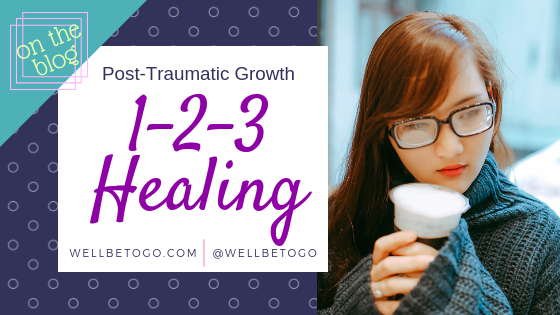The 3 Stages of Healing from Trauma
Trauma is a normal human reaction to abnormal events and circumstances.
The whole 1-2-3 of getting back to “normal” after trauma, grief, and/or loss can take several years. The loss can be due to a wide variety of causes such as divorce, separation, being a victim of abuse, or traumatic grief from a loved one’s death.
When healing from trauma, most clients experience a universal symptom of “uncomfortable loneliness”. Most clients compartmentalize the trauma – and cope with it internally. They continue living regular life in the meantime – and only reach out for help, when they find it intolerable to manage their experience alone. However, reaching out for validation & support is what helps heal trauma more quickly.
Symptoms of trauma or grief present initially as difficulties managing emotions, self-soothing, concentrating, and/or a combination of other uncomfortable thoughts and feelings. Click here for information on post-traumatic stress disorder symptoms from Psych Central.
Often, clients get the message that they need to hurry; deal with the circumstances and get on with it. However, healing is a process; with the potential for significant growth to occur. To those not experienced, it can seem simple on the surface, as in “just get over it”. However, there is an actual science and a psychology behind the recovery process that therapists know very well. That’s why the journey of healing is one best done with empathetic others who have an understanding for the psychological effects of having been witness to a life changing event.
To fully acclimate to a new way of being and achieve post-traumatic growth, the effects of the experience are best managed when the client’s experience is normalized and validated; a safe outlet is provided to learn how to self-regulate & process the experience; and the client is given options on how to manage at their preferred pace.
What then is the process of making sense of this “trauma”, this broken heart syndrome? The following describes my solutions-focused approach in counseling using the three-stage sequence of trauma treatment and recovery process based on the classic work of Judith Lewis Herman, M.D. from her book, “Trauma & Recovery” (1992).
(1) To start, it’s important to come up with an emotional safety plan; learn to work with your inherent resilience; normalize the associated symptoms; learn the basic language of psychology; and assess for any obstacles that could affect recovery such as adverse childhood experiences or environmental limitations.
(2) The work of therapy centers around five core components of restoring trust, safety, intimacy, control, and self-efficacy. In a sense, picking up the pieces of this psychological puzzle and figuring out where things should go to feel better. That’s the counseling part.
Then
(3) My job as a coach is to facilitate transformation beyond the grief and loss; broaden perspectives and balance the picture. I’ll share my experience from having the opportunity to work with hundreds of clients as a sexual assault and domestic violence counselor; and the lessons I’ve learned working alongside established mentors in the field of mental health.
Clinicians spend years studying the cause and effect of traumatic relationships on our self and society. The long story short of what we’ve learned through the research is that the world in which you come back to after a loss is just as crucial as the actual loss. In other words, your experience must be believed.
The process of recovering from trauma & “post-traumatic” growth therefore, requires finding yourself and finding others during your healing journey. The end result of the work is… Integration. Thinking, feeling, and acting from a core belief rooted in freedom. Being able to enjoy and share the first-rate version of yourself in relationships, career, and life no matter how daunting the journey!
I hope you found this article helpful. Those are the 3 phases of trauma recovery. If you have any questions or comments, feel free to email and share your tips, words of wisdom, and feedback with us.
Remember, you are on the road to safety. Keep up the good work & know that YOUR experience matters!
Sincerely,
The Wellbe To Go Team



Recent Comments